We may not rely on our phones for actual calls as often we used to, but these fancy little rectangles of ours still handle more than their share of critical communication.
From emailing clients to texting with colleagues, our smartphones keep us connected to business wherever we may roam. The apps that come installed on devices by default, though, aren't always the best options; in fact, they can often be flat-out disadvantageous when it comes to professional productivity.
I've spent a fair amount of time testing the significant email and texting apps available on Android. These are the titles I'd recommend, broken down by category and purpose — and all free, unless otherwise noted.
The best all-around Android email app for most people
Gmail
Google's Gmail app is both powerful and easy to use — especially if you also use Gmail on your computer. The Android app gives you the same basic inbox setup as the desktop site, complete with all the categories, labels, and other designations you're accustomed to seeing. It taps into Gmail's handy snoozing system, too, and generally just gets the job done with minimal fuss or adjustment required.
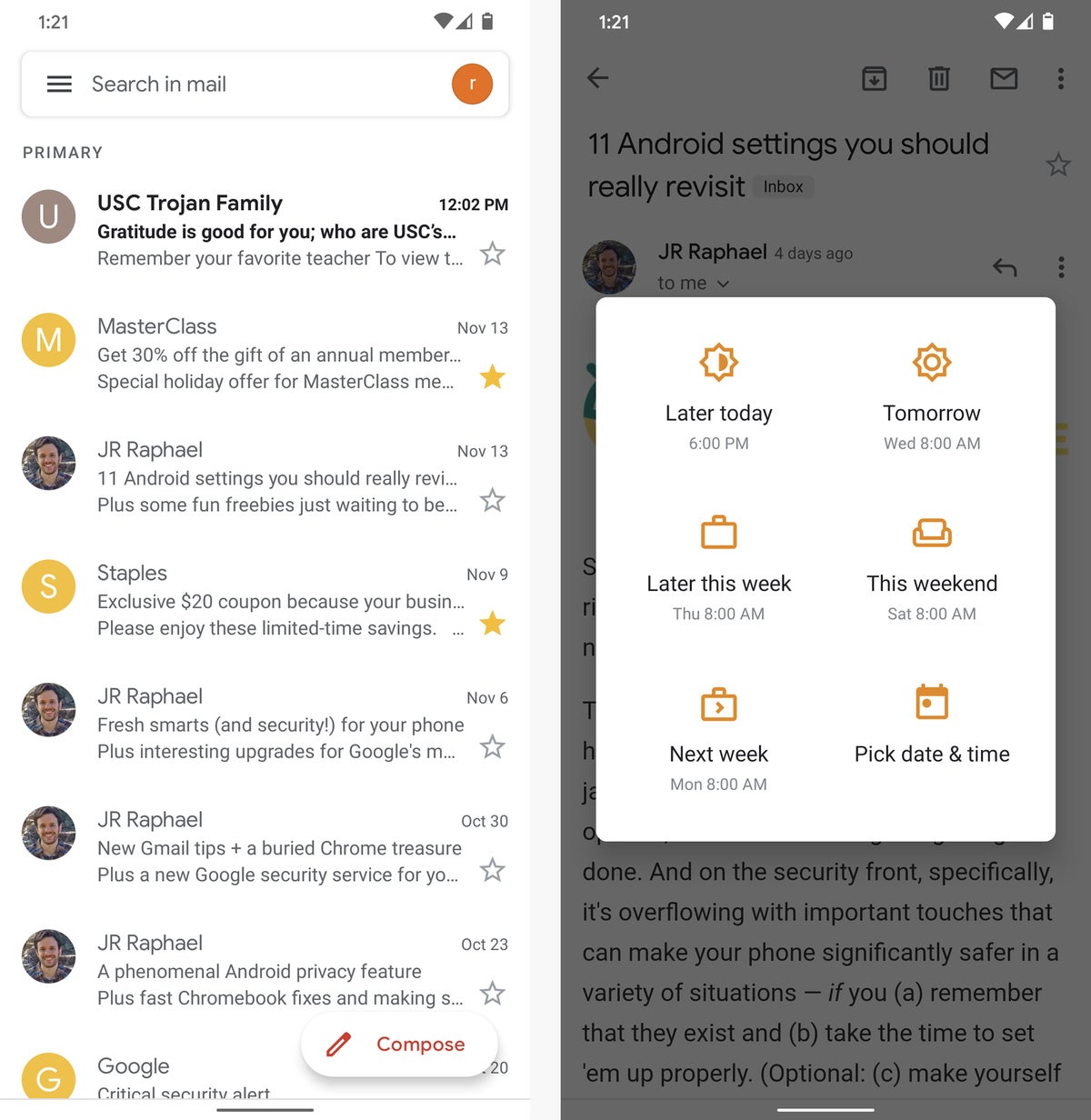 JR Raphael/IDG
JR Raphael/IDG
The Gmail Android app provides a familiar interface and set of features for anyone used to the Gmail website.
And though it's called Gmail, the Gmail app can work with any type of email account or even multiple email accounts — whether they're associated with Google, Microsoft Exchange, or any webmail provider or company server.
(Bonus tip: Gmail for Android has some helpful hidden features, if you feel like exploring.)
The best Android email app if you use Outlook on the desktop
Microsoft Outlook
Whether you use Outlook on your computer or are just immersed in the Microsoft ecosystem in general, the Outlook Android app will make you feel right at home handling email from your phone. Outlook for Android provides an attractive interface with Microsoft's Focused inbox configuration, in which emails are sorted into either a primary tab, if they're deemed worthy of your immediate attention, or an "Other" tab, if they're determined to be unimportant. Like its desktop counterpart, the app even offers integrated access to any calendars associated with your accounts.
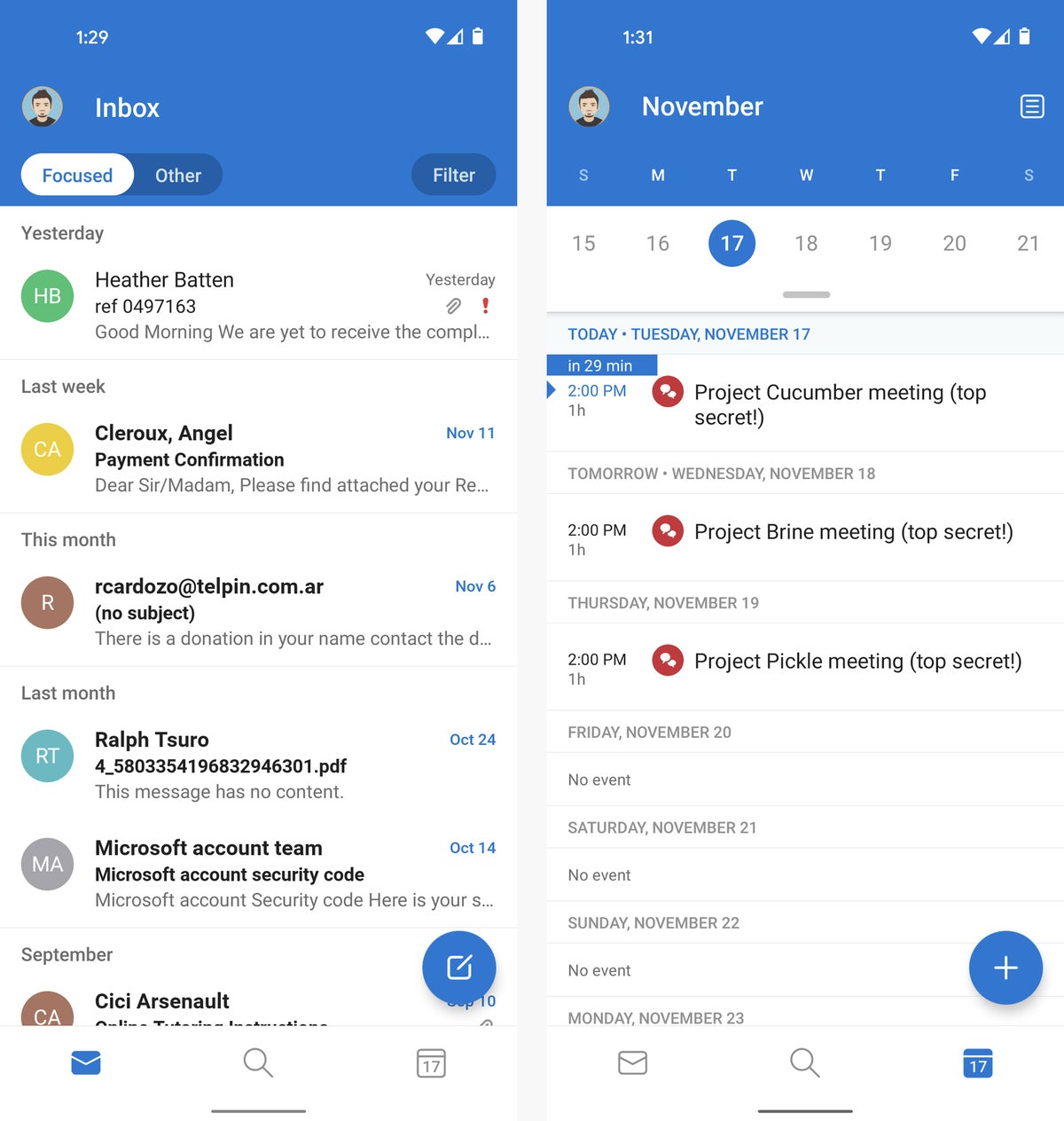 JR Raphael/IDG
JR Raphael/IDG
Outlook provides a commendable mobile environment for anyone invested in Microsoft's ecosystem or products.
The Outlook Android app doesn't have to be only for Microsoft accounts, either; it can handle external email accounts — from any webmail provider or company server — in addition to or instead of a standard Outlook.com address.
The best Android email app if you need encryption
ProtonMail
When it comes to truly secure email communication, ProtonMail is the program you want. It uses an open-source form of end-to-end encryption that allows your messages to remain inaccessible to everyone but your intended recipient — and, if you wish, even inaccessible to that person, if he or she doesn't open your missive within a specified amount of time.
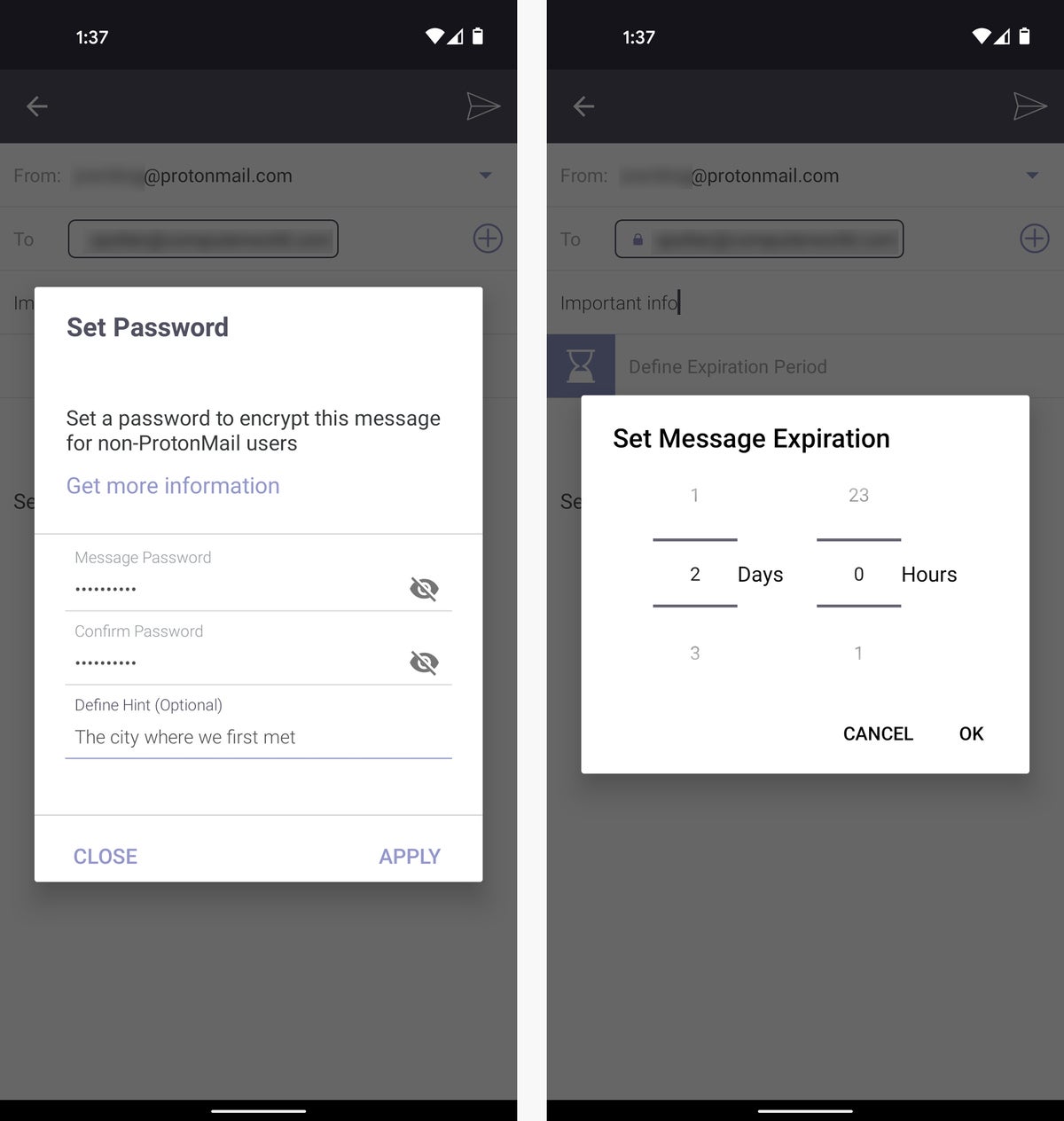 JR Raphael/IDG
JR Raphael/IDG
ProtonMail gives you everything you need to keep your messages private and secure, including password-based encryption and message expiration dates.
The company behind the app is as serious as can be about privacy: You're not required to provide any personal information upon signing up, the service doesn't store any IP addresses or identifying data, and the servers are hosted in Switzerland in order to keep them out of U.S. and European Union jurisdiction — so that even if prosecutors for some reason wanted to get their hands on your data (and don't worry, I won't ask why), they'd have a tough time doing so as a result of Swiss privacy laws.
The service doesn't require your recipients to use ProtonMail. If you send an encrypted message to a regular email address, you simply set a password and provide a hint that only your recipient would understand. He or she will then receive the hint along with a link to decrypt the message. You can also just send regular, unencrypted emails like you would in any other email client.
ProtonMail is free with certain limitations — you can use only a single email address, for instance, along with 500MB of storage and three folders. You can raise those restrictions and add in other advanced features, including the ability to use your own domain, with a paid plan. Those start at $48 a year for individuals and $75 per user per year for businesses.
The best Android email app for team collaboration
Spark Email
Email is an area where team collaboration is often needed — and yet the process for that has remained clunky, inefficient, and mostly unchanged over time. Think about it: When you need to get a co-worker's input on an email you received or ask them to weigh in on a response, what do you do? Odds are, you forward the message to them and then exchange messages back and forth — or maybe work on edits in some other app until you get everything hammered out and ready to be pasted back over.
Spark, in contrast, empowers you to chat with colleagues about an email right alongside that email (imagine that!). It does so by giving you a private, internal chat system that lives inside your inbox: You simply mention a team member in the chat area associated with any message, and you can then communicate with that person about the email, exchange related files, assign tasks and due dates, and even work on a response together right then and there.
 Spark
Spark
Spark makes it easy to chat with colleagues privately alongside an email and even collaborate on a response.
Spark's Android app is nicely designed, too, and chock-full of useful features and customization options. The only real downside is that outside of the mobile domain, Spark is presently available only for macOS — no Windows or web versions yet — which means your options for cross-platform consistency are annoyingly limited (though you can always use the Android app on a Chromebook, if you're in an organization that embraces Chrome OS).
Spark is free for individual use with limited collaboration features (and notably a maximum of just two team members supported). The full team version will set you back $77 per user per year.
The best Android email app if you wish your inbox acted more like Slack
Spike Conversational Email
No matter how much interactivity you inject into your inbox, email by its very nature can often feel a little stodgy compared to the contemporary collaboration tools so many of us now rely on. An app called Spike aims to fix that by taking the modern messaging feel and features of services like Slack and bringing 'em directly into the email environment.
The result is a completely reimagined take on what email ought to be. For individual, person-to-person messages, Spike strips away all the standard email stuff and makes a thread look like a conversation, just like you'd experience in any instant messaging app. You can see when the other person has read your latest message — and if that person is also using Spike, you'll see indicators showing when they're typing, too.
Any conversations that aren't personal in nature — low-priority emails like purchase receipts, newsletters, and social media updates — get placed in a separate "Other" tab that's visible from your main inbox view but separated enough to avoid being a distraction.
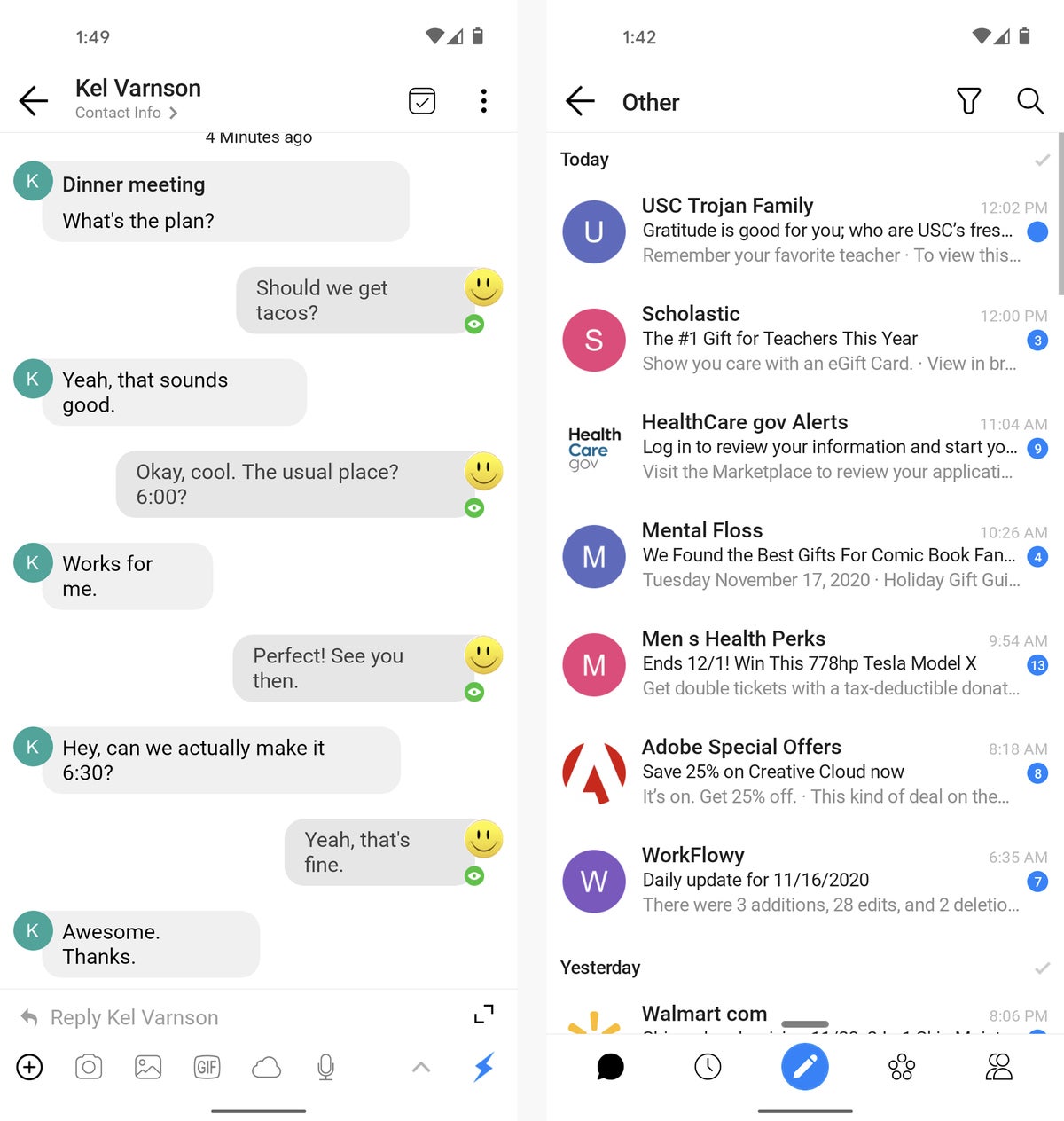 JR Raphael/IDG
JR Raphael/IDG
Spike transforms personal email threads into messaging-like conversations and keeps low-priority emails in a separate (but still visible) area of the app.
Spike makes it easy to create multi-person group threads, which look like Slack channels to you and anyone else using Spike but act like regular cc-centric emails to anyone else involved. It even allows you to create your own private notes and to-do lists right within your inbox. With companion apps available for Windows, macOS, and the web, it really has the potential to change the way you think about email all throughout your day.
Spike is free for personal use, with a limit of 15,000 searchable messages, 20 notes and tasks, and 10 active group chats. Higher-limit pro-level plans are available for $4 per user per month, while even more flexible business plans start at $6 per user per month.
The best all-around Android texting app for most people
Google Messages
For a top-notch Android texting experience, you need to look no further than Google's own simply named Messages app. The once-barebones Messages has matured into a fully featured, polished product with everything most people will need to manage mobile messages effectively.
Messages has a clean and intuitive interface that follows the general Google design language, which makes for a nice bit of consistency, to start. But don't be fooled: Within that framework, the app offers quite a few advanced and unmatched features — such as integration of Google's time-saving Smart Reply system for suggested responses, a native suggested actions system that intelligently surfaces one-tap commands for doing things like sharing your location when appropriate, and a second-to-none, Google-caliber search system that makes it easy as can be to find anything you need from past chats.
Messages has its own built-in reminder system and spam protection system, too, and it's one of the few current messaging apps to support the next-gen RCS (Rich Communication Services) system — a more contemporary SMS-like standard that makes texting feel like a modern messaging experience, with read-message markers, typing status indicators, and other such elements. It'll even soon give you the ability to encrypt your messages, which is a valuable bit of assurance to have for business conversations in particular (though that option will be available only in situations where everyone involved is using an RCS-compatible messaging service, which will severely limit its practical utility).
 JR Raphael/IDG
JR Raphael/IDG
Features like a built-in reminder system and support for the next-gen RCS standard help Google's Messages app stand out from the pack.
You can send and receive your messages from any computer via the Messages web app, and all of your messages are always backed up and synced with your Google account — up to 25MB — which means they'll automatically get restored anytime you sign into a new phone, instantly and without any effort on your part.
That backup notably does not, however, include MMS content — things like photos and videos sent via text. If you want your multimedia messages to be saved or want to go over that rolling 25MB limit in any other way, you'll need to sign up for a paid Google One plan. Those plans start as low as $2 per month and also include extra storage space that can be used across other Google services.
Related: About that Android to iPhone texting squabble...
The best Android texting app for cross-platform encryption
Signal Private Messenger
Need extra privacy for your text-based discussions right now — and/or need to have it available while texting with people across both Android and iOS? Just like ProtonMail does with email, Signal brings reliable, platform-agnostic encryption into the realm of texting. Anytime you're chatting with another Signal user, the open-source service will secure your conversation with end-to-end encryption and without any of your data being stored on remote servers. The app also offers encrypted voice and video calling between Signal users, no matter what platform they're using.
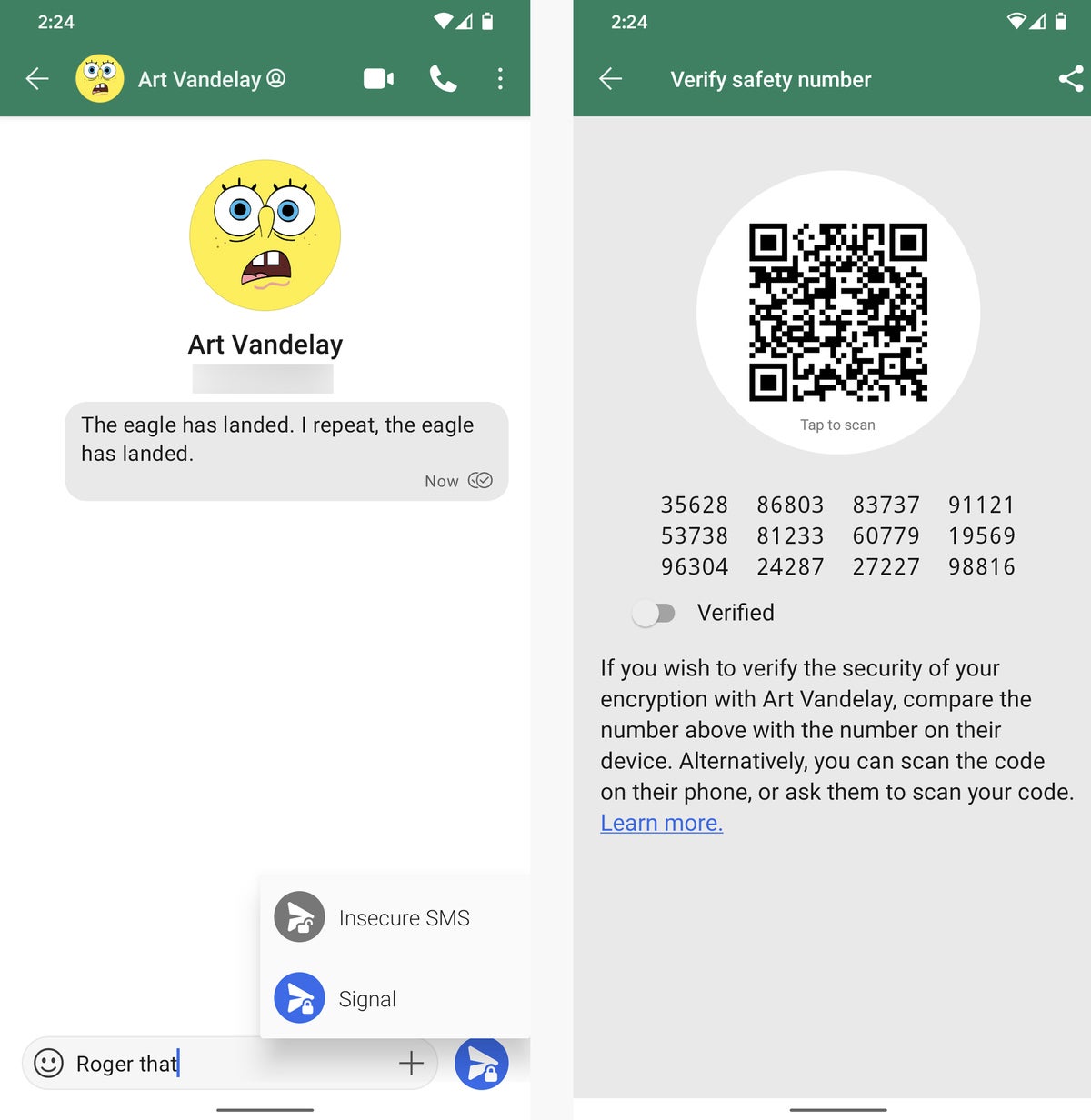 JR Raphael/IDG
JR Raphael/IDG
From automatic encryption to secondary forms of verification, Signal takes security seriously.
If you're texting with someone who doesn't use Signal, the service will alert you that the conversation is unsecured and will then act like any other SMS client. That means you could conceivably use it for all your text-based communication, though it isn't as fully featured as something like Google Messages when it comes to regular conversations. Its desktop client also requires a Windows, macOS, or Linux program to be installed (with no option for a simple web-based interface), and it allows you to send only secure Signal messages from your computer — not regular texts.
When it comes to secure messaging, specifically, though, it doesn't get much more consistent or reliable.
Need more Android app recommendations to flesh out your mobile productivity powers? Check out my collections of the best office apps for Android, the best calendar apps for Android, and the best Android widgets for busy professionals next.
This article was originally published in November 2018 and updated in December 2020.




















